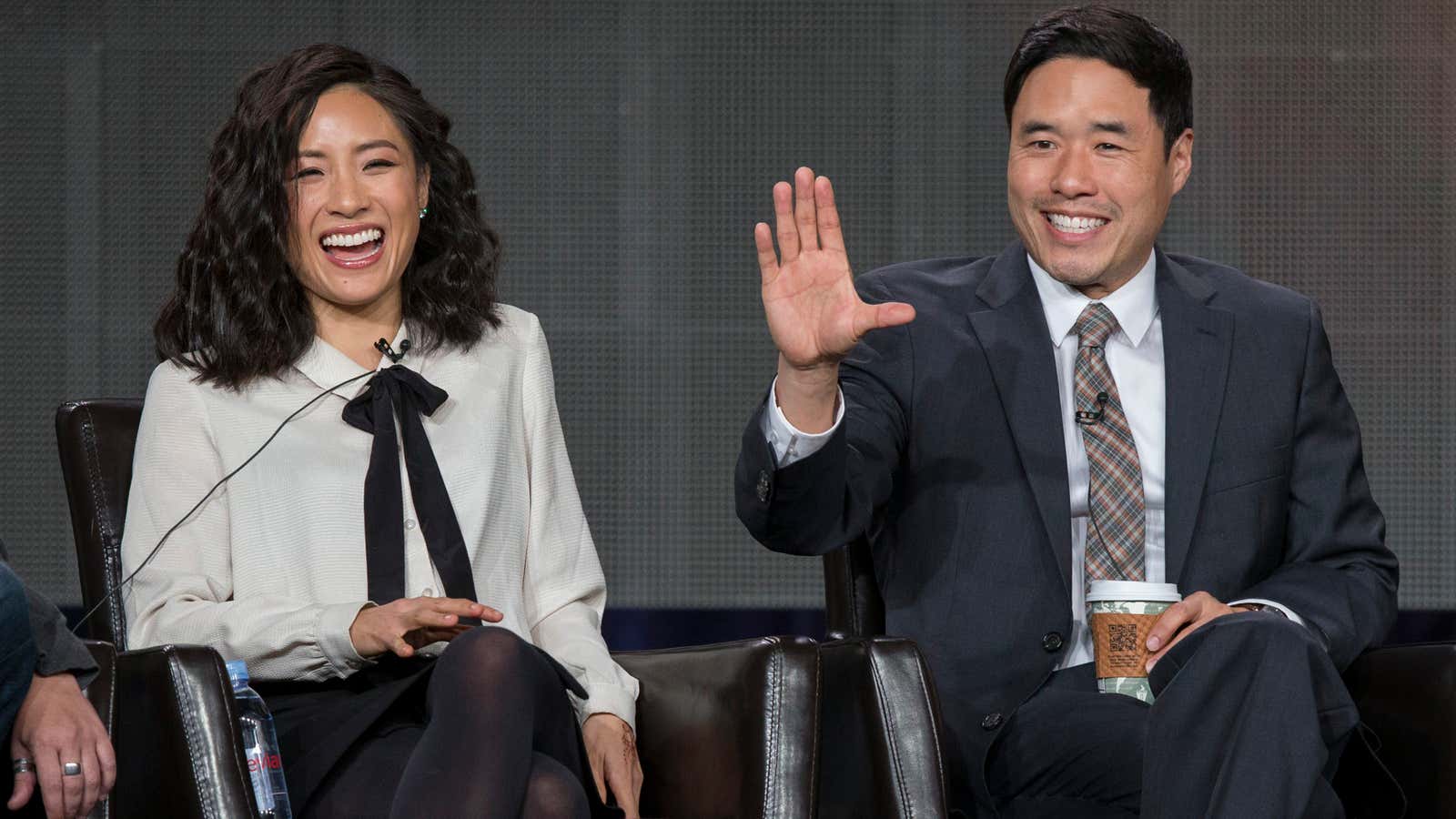For most Americans, seeing manic doctor Ken Park kiss his wife Allison on the new comedy Dr. Ken, or semi-successful restauranteur Louis Huang smooch his better half, Jessica, on returning hit Fresh Off the Boat is nothing remarkable. Sitcom parents have been engaged in public displays of affection on primetime for as long as there have been family sitcoms, after all.
But for those of us who grew up with parents born and raised in Asia—and, based on a 2012 Pew survey, that’s a growing number of us—these lip-locks moments are mind-blowing. Because not only have we rarely seen Asian Americans parents kiss on TV, many of us have never seen them do it in real life either.
It’s not necessarily because our parents don’t love each other. Yes, many immigrant parents are together out of pragmatism rather than passion—betrothed by family, bonded by shared work and responsibility, or beholden to custom and tradition. But behind the codependency (and occasional squabbling) that marks many immigrant-parent relationships is often a surprising depth of affection—and yes, even romance.
My mother, shortly before I left home for college, shared with me how she and my dad first met: He was a young physician-in-training, and as she prepared to come to the US for graduate school, she was helping to manage her family’s business (a neighborhood newspaper distribution service). His path to the hospital went by their office, and he would regularly sit on their stoop, reading from the stacks and racks of publications without purchasing.
Day after day, my mom was sent to go shoo him away—until eventually he got up the nerve to explain that he wasn’t actually there for the free newspapers, he was just finding an excuse to talk to her. (She later said that, in retrospect, she thinks he really was there for the free newspapers. But she was charmed by his words regardless; enough to be married for nearly half a century, anyway.)
Of course, my sister and I didn’t see that side of their relationship. My parents are task mates and complementary life partners—even more now that they’re older. But they never kissed, or hugged, or held hands, or snuggled on the couch when we were growing up. They rarely expressed that kind of physical affection with us either; quick goodbye hugs and hesitant pecks on the cheek for special occasions were more their style. Affection came in the form of food, copious amounts of it, and high expectations: “If I didn’t care about you, I wouldn’t be so convinced you could do better.” You see that sensibility in Louis and Jessica’s parenting of their three boys (including my real-life son, Hudson, who plays eldest kid Eddie).
But you also see them sharing quiet, tender moments, talking about their personal history (sometimes a bit too intimately!) and yes, hugging, cuddling and kissing. And from the very first episode of Dr. Ken, which aired just last Friday, between Ken and his wife Allison, you see even more—the kind of sly banter and verbal flirtation that suggests they have more than just a domestic collaboration, but a sex life that’s active and healthy enough to gross out their adolescent children.
Which, for Asian Americans watching prime time television is a shocking new frontier. We know our parents had sex (well, most of us do; in a Twitter discussion after Dr. Ken aired, Korean-American film and TV writer Young-Il Kim told Quartz that based on what he saw of his parents growing up, he assumed his birth had been immaculate conception); we’ve just never seen that depicted, even by way of innuendo, on primetime television.
Will wonders never cease? We’re poised to soon see even other aspects of life, love and relationship depicted from our community’s traditionally absent perspective: In Fresh Off the Boat, Eddie has already had his first schoolboy crush, his first heartbreak and in upcoming episodes, he’ll have his first date… and first girlfriend. It’s all an example of how this new wave of diversity in Hollywood is the gift that keeps on giving, sweeping aside the stereotypes and caricatures of the past, and leaving in their place something that all of us can recognize, regardless of where we come from and who we are: our humanity.
